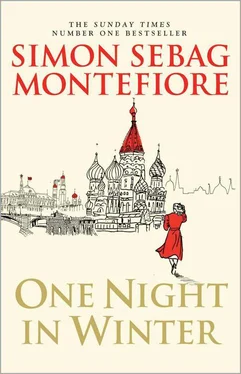‘You’re designing for Comrade Stalin not Hermann Göring!’ hissed Beria to Lerner. ‘It’s back to the drawing-board!’
Lerner wrung his hands and backed away into the ante-chamber.
As Poskrebyshev closed the doors behind him, Beria entered Stalin’s spacious room with its ruffled white blinds covering most of the windows. On the far wall were portraits of Marx and Lenin and the latter’s death mask. A long table with twenty seats, each with notebooks and ink blotters, filled the centre. At the far end was a desk with an extension holding about eight Bakelite telephones and a small table at right angles that formed a T-shape. The desk was very neat with scarcely anything on it except a blotter, an ashtray with a pipe that contained a lit cigarette smoking in its bowl, and a glass of steaming tea. Behind was a grey safe as large as a man and a small door whence Stalin now appeared, bearing a bottle of Armenian cognac. He sat down at the desk, poured two teaspoons of the spirit into the tea which he stirred and then looked up.
‘ Gamajoba .’ He often spoke Georgian to Beria when they were alone. ‘What have got for me?’
‘Much to report, Josef Vissarionovich.’
‘What’s the plan for the German trip?’
Beria opened the leather portfolio and brought out some papers. Even after all these years, all their shared schemes, triumphs of war and construction, and their little secrets of ‘black work’, murder and torture, Stalin still treated Beria like a trusted servant who specialized in dirty jobs. Yes, there had been family holidays on the Black Sea – Stalin liked Beria’s wife Nina and trusted his son Sergo – but still Beria felt under-appreciated. Just in January, at one of the dinners in Yalta, Stalin had introduced him to President Roosevelt as ‘my Himmler’. It was at that moment that he started to hate Stalin. The drunken braggart! Where would Stalin be without him?
‘The meetings with the American President and British Prime Minister are set to begin on the seventeenth of July,’ said Beria.
‘I’ll arrive last. Let the others arrive first,’ Stalin said.
‘Understood.’
‘I miss Roosevelt. This Truman’s not a patch on Roosevelt. As for Churchill, he’ll reach into your pocket to steal a kopeck; yes, even a kopeck.’
‘Everything is ready for you in Berlin,’ Beria told him. ‘The route to Potsdam is 1,923 kilometres. To provide proper security, 1,515 MVD/MGB operatives and 17,409 MVD troops are placed as follows: in USSR, 6 men per kilometre; in Poland, 10 men per kilometre; in Germany, 15 per kilometre. On the route, 8 armoured trains will patrol. Seven MVD regiments and 900 bodyguards will protect you. Inner security by the 6th Department will function in three concentric circles of 2,041 men and—’
‘All right,’ said Stalin, waving his hand. He relit the pipe, puffing clouds of smoke and watching them waft up, his eyes moist slits, almost closed.
‘It’s all in the memo here.’ Beria handed over some typed sheets.
‘I don’t want honour guards and brass bands when I arrive. I mean it. I’m tired.’
‘Understood.’
‘Anything more about the new American weapon?’
‘The nuclear device. Our agents in the British Foreign Office report that it is almost complete. It is possible America will use it against the Japanese. It has astonishing destructive power.’
‘Keep me closely informed. Now, what about the schoolchildren?’
‘We have made some progress…’
‘Some of them are with you?’
Beria knew that ‘with you’ meant in his prisons. ‘Yes, four of them,’ and he gave their names.
‘One of Satinov’s boys, eh? What were they playing at?’
‘We’ve investigated, and discovered that it was the girl – Marshal Shako’s daughter – who shot the Blagov boy, Nikolasha.’
‘Ah – Romeo and Juliet, is that it?’
‘She was in love with him. But he was infatuated with another girl, Serafima Romashkina – you know, the actress’s daughter?’
‘As I thought. A love triangle.’
‘You were right. When Rosa Shako found out Ambassador Blagov was being posted abroad and the boy with him, something snapped and she shot him.’
‘And then herself?’ Suicide was a sensitive subject with Stalin: his wife Nadya had shot herself. A long silence. ‘Nadya would be forty-three now.’ Stalin sighed and then collected himself. Silence. Just the mellow puckering of an old man puffing on a pipe.
Beria waited. He knew Stalin was thinking about the Children’s Case. Beria had no wish to interrogate teenagers. It was messy, too close somehow to his own beloved son who had also attended School 801. ‘They’re just harmless children. Let’s release them,’ he was tempted to say. But he and Stalin knew better than anyone that there was no tool on earth as powerful in the management of men as a threat to their children. He raised his cloudy colourless eyes to meet Stalin’s remorseless gaze.
‘You said they were in fancy dress?’ A tigerish grin.
‘Correct,’ said Beria. Stalin tapped his pipe. Now he was waiting. Beria shuffled his papers and read from Kobylov’s report. ‘“Both dead children were members of a secret group named the Fatal Romantics’ Club. Covert chosen membership. Clandestine meetings in graveyards. Obsession with romance and death.”’
‘Were they reading Dracula ?’ Stalin asked, puzzled.
‘Pushkin.’
‘At least they were studying good literature.’
‘As you saw at once, it’s a teenage love story. An old chestnut. Should we release the children now?’ Immediately Beria regretted his words.
‘Do you know what they were doing?’
‘Kobylov says they were playing something called the Game.’
‘And Kobylov didn’t think to find out what this Game was? And where did Rosa Shako get the gun?’ Beria knew that Stalin had never forgiven his brother-in-law for giving his wife the pistol that she used to shoot herself. ‘There’s more to do in the Children’s Case.’
Stalin leaned back in his chair and pressed a button that rang a bell outside.
Poskrebyshev opened the door and stood to attention, notebook raised, pencil at the ready. ‘Yes, Josef Vissarionovich?’
‘Sasha, let’s invite some comrades to watch a movie and have a snack. Call Comrade Satinov and the rest of the Seven.’
It was already half past midnight. From Vladivostok in the east (where the Soviet armies were massing to attack Japan) to Berlin in the west, the Russians and their new subject peoples slept, but not their leaders. In Moscow, ministers, marshals and Chekists waited at their desks for Comrade Stalin to leave the office. Now that Stalin had summoned the Seven for dinner, Poskrebyshev would let a few favoured friends know that they could go home too.
‘Are you busy later, Comrade Beria?’
‘ Didi madlobt , thanks so much,’ said Beria in Georgian. Busy later? Who dared be busy later? Not him, that was for sure.
AT ONE IN the morning, the Judas port on George Satinov’s cell door clicked open. He was sleeping properly for the first time because he was sure the interrogations were over. His interrogators had seemed satisfied with his answers and then he had been taken back to his cell and given a meal. Now suddenly he feared there was more. The clink of keyrings, the clip of boots on concrete, and then, moments later, the locks were grinding.
‘Get dressed. Now.’ He heard other doors opening, other locks turning and wondered who else from his school was there. As he was escorted along the corridors, he heard another prisoner coming behind him. Was it Vlad? Or Minka? He prayed that Minka was all right and that no one else was in trouble: not Serafima, not Andrei. He longed to see Minka, so that she would know he was nearby and that he had not betrayed her. I wonder if I am in love with her? he asked himself. How does one know?
Читать дальше












